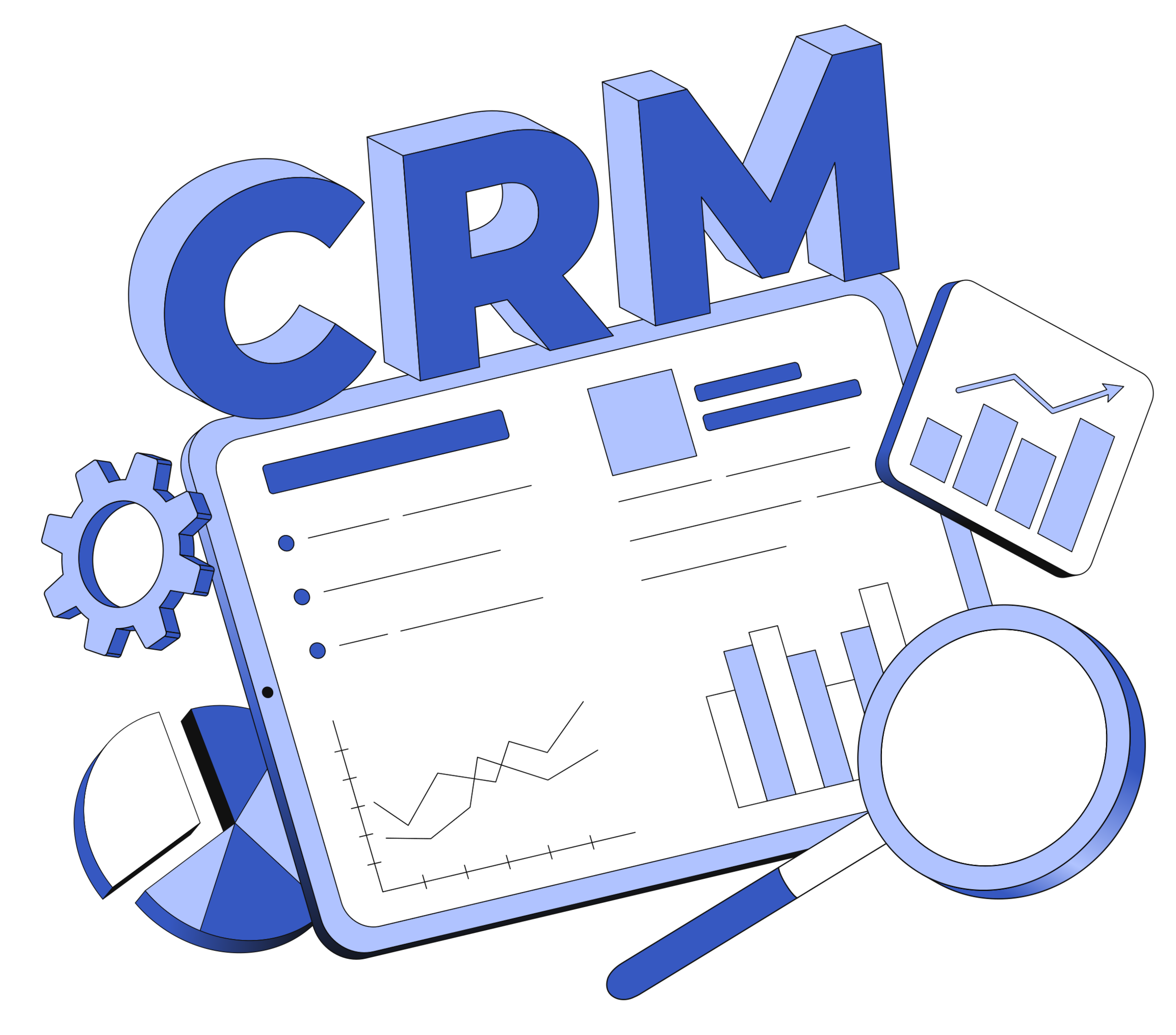In today’s legal world, law firms are always looking to streamline, improve client relationships, and stay ahead of the competition. One tool that can help with that is Law Firm CRM or Customer Relationship Management software.
Selecting the best legal CRM software tailored specifically for law firms is crucial as it enhances attorney-client relationships, streamlines administrative tasks, and helps manage client intake efficiently.
CRMs are often associated with sales and marketing but are now essential for law firms to manage client relationships, data, and operational workflows.
In this post, we’ll look at why law firms need CRMs, what to look for, and how the right CRM can change your practice.
What is a CRM?
A CRM (Customer Relationship Management) system is a tool to manage interactions with existing and prospective clients.
It centralizes client data, including contact details, communication history and case-related documents so law firms can streamline processes, improve communication, and ultimately client satisfaction.
But in the legal industry, the role of a client relationship management tool goes far beyond just managing relationships.
It becomes the backbone of a law firm’s operations by storing sensitive case files centrally, automating client follow ups, and providing insights into case management and firm performance.
Why Law Firms Need a CRM
1. Client Information Management
Law firms deal with a lot of sensitive data, making client management crucial. Legal CRM software is a central database where all client information – case files, contact details, and communication history – can be accessed by authorized team members. No more searching for critical documents or emails; everything is stored in one secure place, ensuring efficient operations. This saves time and reduces errors.
2. Client Communication and Follow-ups
Effective client communication and follow-ups are crucial for building strong relationships with clients and prospects. A good legal CRM software solution should enable seamless communication and follow-ups through various channels, such as email, phone, and text messages. The software should also allow for automated reminders and notifications to ensure that clients and prospects receive timely updates on their cases.
Some key features to look for in legal CRM software for client communication and follow-ups include:
- Automated Email and Text Message Reminders: Ensure that clients never miss important updates or deadlines with automated reminders.
- Customizable Email Templates: Save time and maintain consistency with pre-designed templates for common communications.
- Integration with Phone Systems: Seamlessly track and log phone calls directly within the CRM.
- Task Management for Follow-up Activities: Assign and track follow-up tasks to ensure nothing falls through the cracks.
- Reporting and Analytics: Measure the effectiveness of your communication strategies and make data-driven improvements.
By leveraging these features, law firms can ensure that their clients and prospects receive exceptional service, leading to increased satisfaction and loyalty. Legal CRM software makes it easier to manage ongoing cases and convert potential clients into loyal ones.
3. Case Management
CRMs make case management more structured by linking clients to their cases and tracking all documents, deadlines, and communication related to that case.
Many law firm CRMs integrate with document management systems and billing software so workflows are streamlined and manual effort reduced.
Legal CRM software enhances case management by automating client appointment reminders, streamlining intake processes, and integrating with existing legal systems.
When a CRM integrates with billing software you can track billable hours, generate invoices, and even send automatic payment reminders so case management and billing are more joined up.
4. Client Retention and Satisfaction
Happy clients are loyal clients, and managing relationships with existing clients is crucial. C
RMs help law firms personalize communication based on individual client preferences and history which can strengthen relationships.
By tracking key milestones and following up with clients consistently, they can make their clients feel valued.
5. Data Security and Compliance
Handling sensitive information is part of the daily grind for law firms.
A legal CRM solution not only stores client data securely but also helps with legal and regulatory compliance.
Features like user access controls and encryption protect sensitive information and audit trails provide transparency and accountability.
6. Team Collaboration and Coordination
Team collaboration and coordination are essential for law firms to deliver high-quality services to their clients.
A good CRM should enable seamless collaboration and coordination among team members, including lawyers, paralegals, and administrative staff.
Some key features to look for in a CRM for team collaboration and coordination include:
- Task Management: Assign and track tasks to ensure that all team members are on the same page and deadlines are met.
- Document Management: Share and collaborate on documents securely within the CRM, ensuring that everyone has access to the latest versions.
- Calendar Integration: Schedule meetings and appointments with ease, and sync them with your team’s calendars.
- Reporting and Analytics: Track team performance and identify areas for improvement.
- Customizable Workflows: Automate business processes to streamline operations and reduce manual effort.
By leveraging these features, law firms can ensure that their teams work efficiently and effectively, leading to improved productivity and client satisfaction.
A well-coordinated team is better equipped to handle complex cases and deliver exceptional legal services.
In any law firm, legal client relationship management is crucial as multiple people may work on the same case, making communication and coordination key.
A CRM centralizes all case-related information so team members can assign tasks, track progress, and collaborate efficiently.
So nothing gets missed and cases are managed effectively.
7. Lead Management and Client Onboarding
CRMs also play a big role in managing new client inquiries.
By centralizing leads and inquiries firms can assign prospects to the right attorney or intake team member for follow-up.
Automating the client intake process with customizable templates ensures consistency in collecting the required information and speeds up the onboarding process.
8. Campaign Performance
How do your marketing campaigns perform? With a CRM you can track lead conversion rates and cost per lead.
Types of Law Firm CRMs
Not all CRMs are created equal. Law firms generally need two types of law firm CRM software: client intake software and legal practice management tools. Here’s a breakdown of each:
1. Client Intake Software
These CRMs focus on the client acquisition and onboarding process. Features like lead tracking, automated intake forms, and client qualification make it easier to streamline your firm’s intake process.
Popular examples:
- Clio Grow
- LeadDocket
- Lawmatics
2. Legal Practice & Case Management Tools
Legal practice management CRMs help you manage ongoing cases, client communication, and day-to-day firm operations. Features like document management, task automation, billing, and reporting are integrated into one platform.
Popular examples:
- Clio Manage
- Filevine
- Practice Panther
Key Features to Look for in a CRM for Law Firms
When choosing legal CRM solutions for your law firm, it’s important to consider the specific needs of your practice. Below are some key features to look for:
1. Client Intake Software Features:
- Lead Tracking and Management: Integrate with your lead capture sources (website forms, phone calls, etc.) to centralize data.
- Automated Intake Forms: Customizable forms that feed into the CRM.
- Client Communication Automation: Send automated follow-ups and drip campaigns.
- Lead Source Tracking: Track lead origins to measure marketing success.
2. Legal Practice & Case Management Features:
- Case Organization and Matter Management: Link clients to cases with centralized documentation.
- Document Automation and Secure Storage: Store and generate documents within the CRM.
- Billing and Invoicing Integration: Streamline billing with time tracking and invoicing features.
- Task Assignment and Tracking: Keep track of tasks and deadlines.
Choosing the Right CRM for Your Law Firm
Choosing the right CRM for your law firm can be a daunting task, given the numerous options available in the market.
However, by considering the following factors, you can make an informed decision that meets your firm’s unique needs:
- Identify Your Firm’s Specific Needs and Goals: Understand what you want to achieve with the CRM, whether it’s improving client intake, enhancing communication, or streamlining case management.
- Evaluate the CRM’s Features and Functionality: Ensure that the CRM offers the features that are most important to your firm, such as document management, task automation, and billing integration.
- Assess the CRM’s Scalability and Flexibility: Choose a CRM that can grow with your firm and adapt to changing needs.
- Consider the CRM’s Integration with Existing Systems and Tools: Ensure that the CRM can seamlessly integrate with your current software and tools.
- Evaluate the CRM’s User Interface and User Experience: A user-friendly interface is crucial for ensuring that your team adopts and effectively uses the CRM.
- Assess the CRM’s Customer Support and Training: Reliable customer support and comprehensive training are essential for a smooth implementation and ongoing success.
By considering these factors, you can choose a CRM that aligns with your firm’s goals and objectives, leading to improved productivity, client satisfaction, and revenue growth.
Top CRMs for Law Firms
When it comes to customer relationship management (CRM) software, the legal industry has specific needs that generic platforms can’t meet. Popular CRMs like Salesforce and HubSpot are powerful but not tailored to the law firm. Law firms need more than just a place to store client information; they need tools that manage cases, comply with strict legal rules, manage deadlines, and track billable hours. Legal CRMs are designed to handle all this complexity and offer a more bespoke set of features to supercharge your law practice.
Unlike general CRMs, legal CRMs have case management tools, automated document generation, client communication tracking, and features to help law firms stay on top of compliance rules. By combining these solutions, they can improve client relationships and make sure important deadlines and tasks don’t fall through the cracks. Legal CRMs also allow firms to streamline their workflows, assign tasks, track progress, and analyze key performance metrics to continuously improve.
Here’s a quick look at some of the top CRMs for law firms:
Clio Grow & Manage
Clio is one of the biggest names in legal CRM software, with two products: Clio Grow and Clio Manage. Clio Grow is for client intake, managing leads, onboard new clients, and automating follow-up tasks. Clio Manage is for managing ongoing cases, with features like task assignment, time tracking, billing, and document management. The combination of both products gives law firms a complete solution from attracting new clients to managing existing cases with precision and ease. Clio also integrates with other third-party tools so firms that use multiple legal techs can have a seamless experience.
LeadDocket
LeadDocket is another legal CRM for client intake. Its main function is to streamline lead management by automating follow-up tasks and making sure no leads fall through the cracks. LeadDocket integrates with other practice management tools so firms can convert leads into clients. One of the standout features of LeadDocket is its referral management, which allows firms to track and nurture leads from other attorneys. This is a key feature for firms looking to grow their practice through networking and partnerships.
Lawmatics
Lawmatics is an all-in-one legal CRM platform for client intake, marketing automation, and client relationship management. It’s perfect for firms that want to automate marketing tasks like sending out newsletters or scheduling follow-up emails to potential clients. Lawmatics helps firms streamline their client acquisition process and manage existing client relationships with ease. Its automation features help firms nurture leads better and keep the communication flow with clients consistent which is key to building trust and long-term relationships.
Filevine
Filevine is a legal case management platform with CRM features to help law firms manage both client relationships and ongoing cases. It has robust document management, task automation, and project management features so it’s perfect for firms that handle complex litigation. Filevine also has reporting features to track key performance metrics like case progress and team productivity. So firms can identify bottlenecks and inefficiencies in their workflows and make data-driven decisions to improve.
PracticePanther
PracticePanther is a popular legal CRM that makes law practice management simple and easy. With time tracking, billing, and client communication tools PracticePanther is perfect for small to medium-sized firms looking to get more efficient. One of the key benefits of PracticePanther is its user-friendly interface so firms can get up and running without a big learning curve. It also integrates with popular accounting and document management software so it’s a great all-in-one solution for firms.
Implementation and Best Practices
Implementing a CRM in a law firm is not just about installing software and hoping for the best. A well-thought-out plan is necessary to ensure the software is adopted smoothly and delivers the expected results. Here’s how firms can get the most out of their CRM:
Careful Planning and Data Migration
Before jumping into any CRM solution, firms must plan the implementation process carefully. This starts with migrating existing data from spreadsheets, old systems, or even paper records into the new CRM. Ensuring all client and case data is transferred correctly is key to a smooth transition. Firms should also check if the CRM is compatible with other software they use like billing systems, document management tools, and communication platforms. Data integrity is key so attention to detail during migration is crucial to avoid losing or corrupting important information.
Team Training and Buy-In
A CRM is only as good as the people using it. For a CRM implementation to be successful, you need buy-in from the whole team. That means training staff on how to use the system, explaining the benefits, and showing how it will make their daily tasks easier. If staff feel overwhelmed by the new technology they may resist using it which can undermine the whole implementation process. So firms should invest in comprehensive training sessions and provide ongoing support so everyone is comfortable using the CRM.
Customization for Maximum Efficiency
No two law firms are the same so customization is key when implementing a CRM. Most legal CRMs offer customization options so firms can tailor the platform to their specific workflows and needs. For example, firms can customize task lists, client communication templates, and reporting dashboards to match their internal processes. By aligning the CRM to the firm’s unique operations lawyers and staff can work more efficiently and focus on client service, not administrative tasks.
Ongoing Maintenance and Data Cleansing
Implementing a CRM is not a one-off. Ongoing maintenance is required to keep the system running smoothly and to ensure it continues to meet the firm’s needs. That means applying software updates, troubleshooting issues, and cleansing data to remove duplicates or outdated information. A clean and well-maintained CRM will run more efficiently reduce the risk of errors and ensure client information is up to date.
KPIs
To measure the success of a CRM you need to set measurable goals and key performance indicators (KPIs). These might be client satisfaction, case turnaround times, and revenue growth. Reviewing these KPIs regularly will help firms see if the CRM is delivering the expected benefits and where to improve. For example, if response times to clients decrease or case management becomes more streamlined then the CRM is working. Overcoming Common Challenges
Law firms often face common challenges when implementing a CRM, including:
- Resistance to Change from Team Members: Change can be difficult, especially if team members are accustomed to existing processes.
- Difficulty in Integrating the CRM with Existing Systems and Tools: Ensuring seamless integration can be technically challenging.
- Limited Technical Expertise: Not all team members may have the technical skills required to use the CRM effectively.
- Insufficient Training and Support: Without proper training and support, team members may struggle to use the CRM to its full potential.
To overcome these challenges, law firms can:
- Communicate the Benefits of the CRM to Team Members: Help your team understand how the CRM will make their jobs easier and improve client service.
- Provide Comprehensive Training and Support: Invest in training sessions and ongoing support to ensure that all team members are comfortable using the CRM.
- Engage with the CRM Vendor’s Technical Support Team: Leverage the expertise of the CRM vendor’s support team to address any technical issues.
- Develop a Phased Implementation Plan: Roll out the CRM in phases to allow for a smoother transition and address any issues as they arise.
- Monitor and Evaluate the CRM’s Effectiveness: Regularly assess the CRM’s performance and make adjustments as needed to ensure it continues to meet your firm’s needs.
By overcoming these challenges, they can ensure a successful CRM implementation that drives business growth and improvement.
The Future of CRM in the Legal Industry
The future of CRM in the legal industry is exciting and rapidly evolving.
Emerging trends and technologies, such as artificial intelligence, machine learning, and blockchain, are transforming the way law firms interact with their clients and manage their businesses.
Some key trends to watch in the future of CRM in the legal industry include:
- Increased Adoption of Cloud-Based CRM Solutions: Cloud-based CRMs offer greater flexibility, scalability, and accessibility, making them an attractive option.
- Growing Use of Artificial Intelligence and Machine Learning: These technologies can automate routine tasks, provide predictive analytics, and enhance decision-making processes.
- Integration of CRM with Emerging Technologies: Technologies like blockchain and the Internet of Things (IoT) can further enhance the capabilities of CRMs, providing greater security and connectivity.
- Greater Emphasis on Client Experience and Satisfaction: As competition in the legal industry intensifies, law firms will increasingly focus on delivering exceptional client experiences.
- Increased Focus on Data Security and Compliance: With the growing importance of data privacy, law firms will prioritize CRMs that offer robust security features and compliance with regulations.
By staying ahead of these trends and technologies, law firms can ensure that their CRM solutions remain relevant and effective in driving business growth and improvement.
Embracing these advancements will enable law firms to deliver better services, enhance client relationships, and stay competitive in the evolving legal landscape.
Why Every Law Firm Should Consider a CRM
In today’s fast-paced and competitive legal world law firms must evolve. The legal industry is no longer just about courtroom skills or depth of knowledge; operational efficiency and client relationship management are just as important. Firms that don’t adopt modern tools to help with these areas are at a disadvantage. One such tool that can transform how law firms work is Customer Relationship Management (CRM) software. While traditionally used in sales and marketing industries CRM systems have found their way into law firms to help firms streamline, improve client satisfaction, and comply with regulations.
Here’s why every law firm, big or small, should get a CRM:
1. Streamline for Efficiency
Lawyers have multiple hats to wear every day; client meetings, research, court appearances, and document preparation. With so many balls in the air, there’s little time for administrative tasks like managing client communications, tracking time, and keeping up with deadlines. Without a centralized system, these tasks can become chaotic and lead to inefficiencies, missed opportunities, and costly mistakes.
A CRM for law firms can simplify these operational tasks. For example, it allows lawyers to track client interactions, schedule appointments, and manage case-related documents from one place. Instead of using multiple tools like email, spreadsheets, and physical files, a CRM consolidates all client and case data into one place. This reduces errors, saves time on administrative work, and lets lawyers get back to what they do best; practicing law and delivering results for their clients.
2. Client Satisfaction and Retention
Any law firm’s success is based on attracting and retaining clients. In an age where clients have high expectations of responsiveness and personal service, law firms can’t afford to fail on client relationship management. Poor communication or mismanagement of case details can lead to dissatisfied clients and damage to the firm’s reputation.
A properly implemented CRM can improve client satisfaction by giving law firms the tools to be organized and responsive. By centralizing client data a CRM allows lawyers and support staff to access case details, communication history, and important documents in an instant. So every interaction with a client is informed and personal. When clients feel their lawyer knows their case inside out and can get back to them quickly on their concerns it builds trust and strengthens the lawyer-client relationship.
3. Compliance and Data Security
In the legal world compliance with industry regulations and data security is key. With the sensitive nature of legal work law firms are responsible for ensuring client data is handled with the utmost confidentiality. Mishandling client data or failing to comply with regulations can have severe consequences including legal action and damage to the firm’s reputation.
A CRM for law firms has features that help with compliance with industry regulations like the General Data Protection Regulation (GDPR) and the Health Insurance Portability and Accountability Act (HIPAA). Many CRMs have security features like encryption, access controls, and audit trails that provide a record of who accessed client data and when. These features not only protect sensitive information but also give law firms the ability to prove compliance during audits or in response to regulatory inquiries.
4. Solutions for Legal Practices
Not all CRMs are created equal and law firms have unique needs that general business CRMs won’t address. Fortunately there are CRMs designed specifically for legal professionals. These legal CRMs are tailored to the workflows, terminology, and requirements of the legal industry and provide tools that go beyond traditional customer management.
Get Started Today
Having a CRM in your law firm is no longer a nice to have – it’s a must-have in today’s competitive legal landscape. Streamlining daily operations, improving client satisfaction and compliance with industry regulations can be a winning formula for any firm. Whether you’re a small firm looking to improve client intake or a large firm looking to manage complex cases more effectively there’s a CRM for you.
Get started: look at Law Firm CRM and start transforming your practice today. By using a CRM you’ll not only improve internal efficiency but also client relationships and ultimately your firm’s long-term success.
































